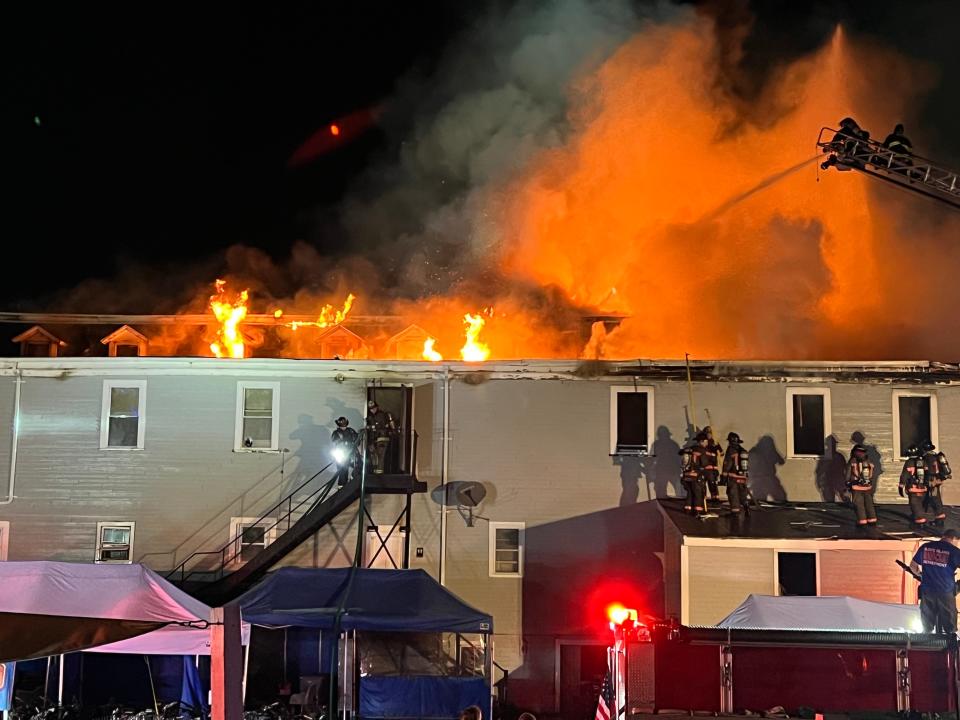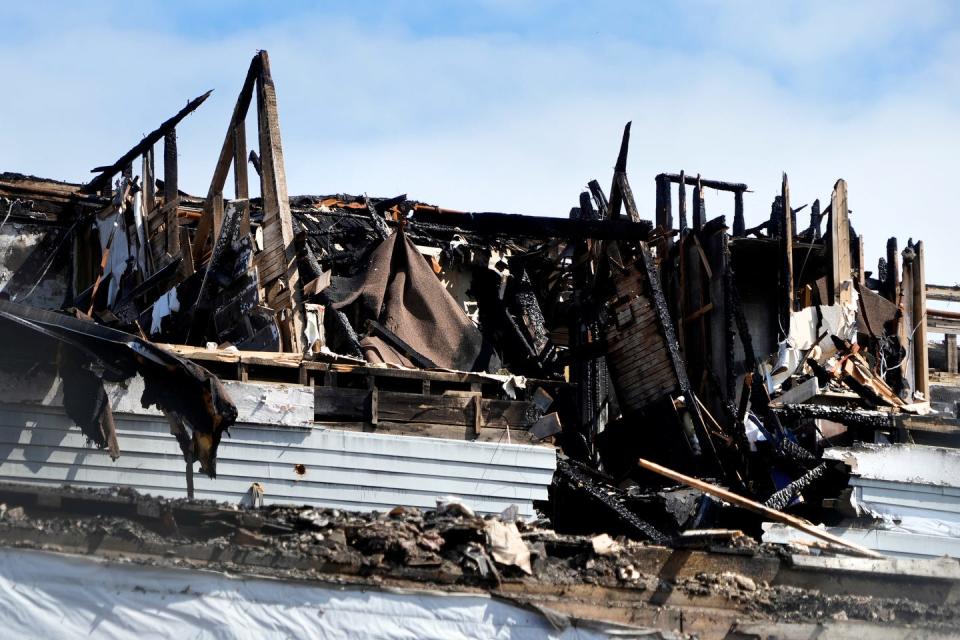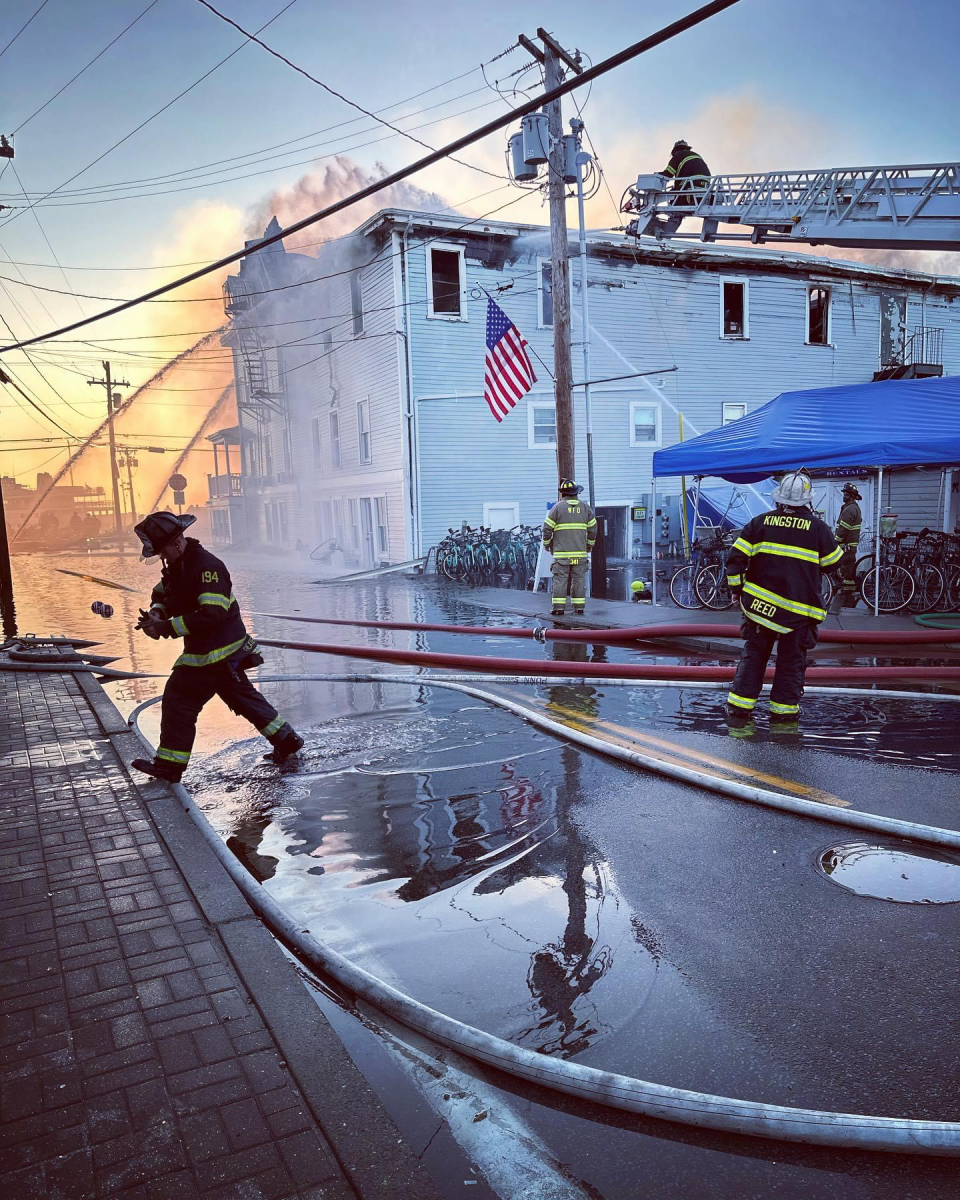Report: Grease buildup, faulty fire-suppression system led to Harborside Inn fire
NEW SHOREHAM – The fire-suppression system in the kitchen of the Harborside Inn didn't work and had been wrongly tagged as compliant, according to a newly released report from the state fire marshal's office that outlines the causes of the massive fire that erupted on the night of Aug. 18.
Additionally, the kitchen exhaust hood hadn't been cleaned properly, and built-up grease probably helped to accelerate the fire.
Manufacturer warned that the system might not suppress a fire
According to the report, Peter Freund, the owner of Emergency Services of New England LLC, told investigators that the control head for the fire-suppression system was not rated for use with the wet chemical cylinder.
"Peter Freund stated that he had verbally advised the building owner that the two components were not listed for use together but that, when the building owner did not want to pay for a new control head, Freund tagged the system as compliant regardless," the report states.
"When queried, Freund stated that two other businesses on Block Island had the same control head and wetchemical cylinder: Club Soda and Mohegan Café," it goes on to say.

More on the fire: Block Island could have been 'the next Lahaina' during hotel fire. How downtown was saved.
Officials subsequently shut down the kitchens at Club Soda and Mohegan Café & Brewery until the systems could be updated and brought into compliance.
Freund, 66, of East Hampton, Connecticut, holds a journeyman license to service extinguishing equipment. He admitted that he did not test components of the Harborside's suppression system, including the gas-shutoff valve.
"During the scene examination, manual operation of the gas shutoff valve revealed it was frozen open," the report states. "It would not have operated if the suppression system activated."
The system had been tagged as compliant since 2017, and most recently in April 2023.
"The manufacturer specifically warned that the system may fail to operate and may fail to extinguish a fire," the fire marshal's report states. "This is evidenced by the fire at 41 Water Street on 8/18. The fact that Freund allowed this condition to continue may represent gross malpractice and/or incompetence."
U.S. District Court records in Connecticut indicate that Freund, then the owner of the fire-safety firm AAA Fire & Safety, pleaded guilty in 1999 to mail fraud involving the transportation of hazardous chemicals. He was sentenced to serve four months in prison.
Federal authorities also accused Freund in 2013 of failing to pay his income taxes in a case that ended with a judicial sale, court records show.
He was identified in a 2018 news report as assistant chief of the East Hampton Fire Department.
When reached by a Journal reporter, Freund said that he had not seen the report yet and could not comment. Michael Finnimore, owner of the Harborside Inn and the Water Street Inn, where the Mohegan Café & Brewery is located, declined to comment, saying that he had not yet seen the report.

Grease also contributed to fire's spread
The restaurant inside the hotel, the Harbor Grille, was leased by Atanas Krastev at the time of the fire.
According to the report, Krastev told investigators that he was responsible for all the equipment inside the kitchen, and that the exhaust hood was typically cleaned at the beginning and end of the season.
However, fire investigator Hannah J. Burnes determined that the last hood-cleaning had actually taken place in May 2022, more than a year before the fire.
"This is well outside the timeline stated to me by the restaurant staff and outside the allowable time per Rhode Island Fire Code," she wrote. "It explains the advanced level of grease accumulation in the hood system, which would have acted to accelerate fire growth."
Burnes observed that cooking surfaces did not seem to be cleaned routinely, and two protective baffles were missing from the hood system.
“Accumulations of grease and food debris was noted throughout the length of the cook line and on every appliance,” she wrote. “Grease drips were visible on sides of appliances and solidified grease was observed on the floor.”
The fire marshal's report hypothesizes that the fire probably started when grease was ignited by a stovetop burner or an ember. It's likely the blaze spread through the hood and entered a wall cavity, allowing it to move upwards toward the building's roof.
"This fire was caused either by unattended cooking or failure to maintain protective baffles in the hood," the report says. "In both scenarios, the maintenance and cleaning of the hood was a factor."
Attempts to reach Krastev for comment on Friday were not successful.
Was a burner accidentally left on?
The fire marshal’s report doesn’t conclusively answer the question of what sparked the blaze in the first place.
According to the report, the last person in the restaurant was general manager Georgi Yanev, who left at 10:40 p.m.

"Yanev is responsible for the closing process, but the cooking appliances and exhaust fans had already been turned off when he did his rounds," the report says. "He ran his hand along the cook surface to check for abnormal heat but stated it was only lightly warm and this was normal."
Matthew Kessler, the evening chef, told investigators that he worked until 10 p.m. and was the one to turn off all the cooking appliances.
Christopher Reed, a retired firefighter from Connecticut who was staying in the room above the kitchen and tried to extinguish the flames after the fire alarm went off, told investigators that he saw a large pot on fire on top of a cooking surface.
When investigators inspected the kitchen after the fire, they found that four burners on one of the kitchen ranges had been turned on. However, because Reed said that he had turned three or four knobs while trying to put out the fire, investigators couldn’t determine if any of burners were already on when he entered the kitchen.
A metal pot was found on one of the activated burners. Its underside did not have the kind of heavy damage that “might be expected if the contents had ignited as a result of being on an activated burner for an extended period of time,” the report says.
The pot did contain a large amount of grease that “was likely there pre-fire,” the report says. If a burner was left on, the grease could have ignited.
However, according to Kessler, the restaurant stopped cooking at 8:45 p.m. on the night of the fire. Staff remained in the kitchen area for another two hours afterwards and did not report noticing anything unusual, the report states.
“This is a long time frame for a fire to smolder undetected within the kitchen hood and too long for a fire originating on an accidentally activated stove burner,” Burnes wrote. She said that it would have taken 20 to 80 minutes for the oil to ignite, meaning that staff would still have been in the kitchen.
The interior camera system was damaged by salt water, so it’s not clear if anyone used the stove after 8:45 p.m. “The possibility of unattended cooking cannot be eliminated at this time, but also cannot be confirmed," the report says. (Salt water was used to suppress the fire so that the firefighters wouldn't deplete the municipal water supply.)
Conversely, the report says, a support beam near the exhaust fan was deeply charred in a manner that “indicates an extended burn time.” Because of the missing baffles, it’s possible that the exhaust fan could have helped pull embers into the hood system, the fire marshal's office noted.
A fire inside the wall cavity or the hood “would be blocked from view from staff and more likely to burn undetected,” and is a possibility that can’t be ruled out, the report states.
This article originally appeared on The Providence Journal: Harborside Inn had out-of-compliance fire suppression system, report finds

